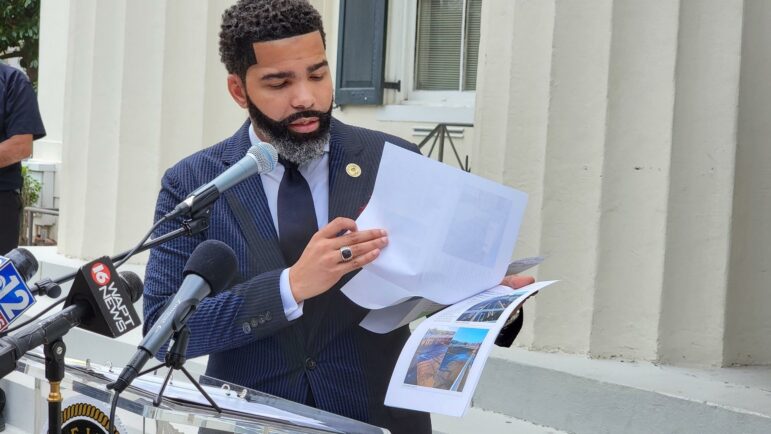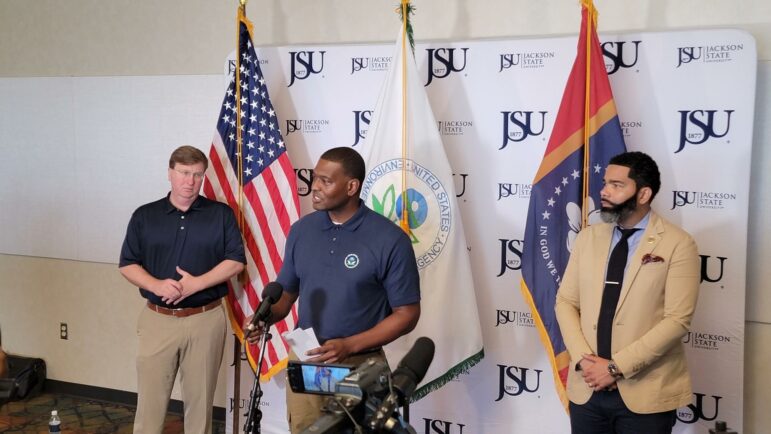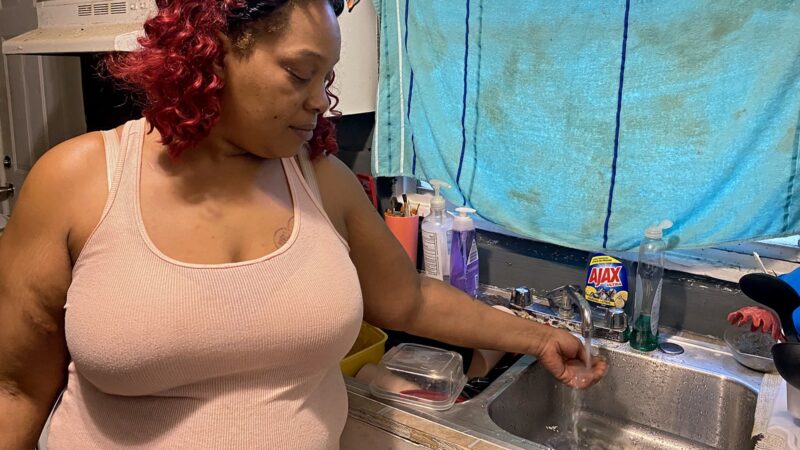Jackson’s water crisis put new attention on its longstanding lead contamination issue
In this file photo, South Jackson resident Baylis McDaniels runs water from the tap in her home, Feb. 2021. McDaniels said she only uses it to bathe and wash dishes. Over the past year, nearly 1,800 lawsuits have been filed against city and state officials over lead exposure from the city's water.
Over the last month, Jackson’s city water system collapsing has garnered international attention and the threat of potential federal legal action. For residents, it’s just another example of their years-long struggle with the city’s water infrastructure.
Jackson’s latest water woes include a city-wide boil water notice that was lifted in mid-September. Over the last two years, the city has issued nearly 300 boil water notices and experienced multiple water line breaks, according to the Environmental Protection Agency. Flooding in late August caused water pressure issues that led President Joe Biden to issue an emergency declaration for Mississippi.
As evidenced by the roughly 300 boil water notices that have been issued over the past two years, the multiple line breaks during the same timeframe, and the recent drinking water crisis, it’s clear the people of Jackson, Mississippi have suffered long enough.
— Michael Regan, U.S. EPA (@EPAMichaelRegan) September 26, 2022
Longtime resident Nikki Martin has experienced most of it. Martin lives in Jackson with her eight and 14-year-old children. After 37 years as a resident, she’s already decided that if she ever buys a house, it will be anywhere but Jackson.
“The water is the reason why,” Martin said.
The situation that helped her come to that decision was the February 2021 ice storm. The storm hit large parts of the South, including Mississippi. In Jackson, it nearly halted the aging O.B. Curtis Water Treatment Plant, the city’s main treatment plant, leaving thousands without access to running water.
Martin has vivid memories of going outdoors to collect melting ice or the water from her apartment complex’s swimming pool just to flush the toilet.
“So that right there alone made me reconsider. I don’t even want to be a citizen of Jackson anymore,” Martin said.
‘I just want a solution’
While her water eventually returned to its normal pressure and color, her concerns with its quality haven’t abated because “what we can’t see is worse,” Martin said.
The unseen force Martin is referring to is lead contamination in Jackson’s water. Since October 2021, nearly 1,800 lawsuits over lead exposure have been filed against state and city leaders.

Martin joined hundreds of other parents and their children at the Mississippi Children’s Museum on September 14 for an update on the status of the lead lawsuits. The lawsuits seek legal relief and damages, but Martin, above all, wants answers.
“I just want a solution, that’s all,” she said.
The Jackson lawsuits are being handled by New York law firm Levy Konigsberg, the same team that successfully sued Flint, Michigan for its own lead contamination problem with its drinking water that made international headlines in 2016.
Corey Stern, one of the lawyers on the case, said it can take years to resolve water quality problems in court. In Flint, it took seven years. He hopes Jackson’s problems are resolved sooner.
Parallels with Flint, and other Gulf South cities
Previously, Mayor Chokwe Antar Lumumba said completely updating Jackson’s water system could take up to $2 billion, which city leaders said they can’t afford. Similar environmental justice issues are occurring across the Gulf South.

Last year, the U.S. Department of Justice opened a civil rights investigation in Lowndes County, Alabama. The residents there — a mostly Black population — have struggled with raw sewage backing up into their homes and pooling in their yards for years. The agency is investigating if they have been discriminated against by the county and the state.
The majority-Black residents of a former public housing project in New Orleans are still dealing with the repercussions of years of lead exposure. It took nearly two decades for the city to settle a class-action lawsuit accusing its housing authority of causing the problem.
Stern doesn’t think systemic failures are always intentional. Flint and Jackson both have poverty rates nearly twice the national average. Stern said communities, like these two, are susceptible to harm because the city governments don’t have the resources to address all their issues and must prioritize more tangible problems — like safety.
“The folks in Jackson are a victim of circumstances that, in many ways, are beyond their control and it’s the same in Flint,” Stern said. “Communities that struggle financially always have the least amount of resources, they always have the least amount of people advocating for them.”
The EPA gets involved
Jackson’s current water crisis and its ongoing water infrastructure problems have prompted multiple visits from Michael S. Regan, the administrator of the EPA.
Monday, Regan met with Assistant Attorney General Todd Kim of the DOJ and Mayor Lumumba “to discuss the actions the federal government is prepared to take to help remedy this longstanding injustice,” according to a statement from Regan.

City officials shared their own response, stating they planned to work with the Justice Department and EPA to “craft a comprehensive plan to remedy violations under the [Safe Drinking Water] Act and create a schedule for implementing that plan.”
And in a press conference earlier this month, Regan mentioned another issue that makes fixing Jackson’s water system a bigger priority: climate change. Extreme weather will be even harder for cities with fragile water systems to deal with, he said. But getting cities like Jackson to plan for climate change is a big ask, especially as the list of water-related lawsuits continues to grow.
“We have to be able to look at the repairs that need to take place on a normal basis. But we also have to begin to make investments to ensure that not only we build functioning water systems, but that they are more resilient to the types of storms that we’re seeing as we move forward,” Regan said.
Mississippi Public Broadcasting’s Kobee Vance and Gulf States Newsroom’s Maya Miller contributed to this report.
This story was produced by the Gulf States Newsroom, a collaboration among Mississippi Public Broadcasting, WBHM in Alabama and WWNO and WRKF in Louisiana and NPR.
Park Fire in California could continue growing exponentially, Cal Fire officer says
Cal Fire has confirmed that over a hundred structures have been damaged in the Park Fire, which grew overnight near Chico, Calif. Difficult firefighting conditions are forecast through Friday night.
Checking in with Black voters in Georgia about the election, now that Biden is out
Some voters who could be key to deciding who wins Georgia. What do they think about Vice President Harris becoming the frontrunner in the race to be the Democratic nominee?
Tahiti’s waves are a matter of ‘life and death’ for surfing Olympics
Tahiti's Teahupo'o wave has a slew of riders for the Paris 2024 Olympics. NPR finds out why it's called one of the most dangerous waves.
Researchers are revising botanical names to address troubling connotations
Since the mid-1700s, researchers have classified life with scientific names. But some of them have problematic histories and connotations. The botanical community is trying to tackle this issue.
A spectacular opening ceremony wowed a global audience despite Paris’ on-and-off rain
The Paris Olympics opening ceremony wowed Parisians, fans and most everyone who was able to catch a glimpse of thousands of athletes floating down the Seine to officially begin the Games.
Kamala Harris faces racism and sexism as she moves closer to presidential nomination
As Vice President Kamala Harris ramps up her campaign for president, Republicans are trying out new — and old — attacks focused on her race and gender, including calling her a "DEI candidate."


